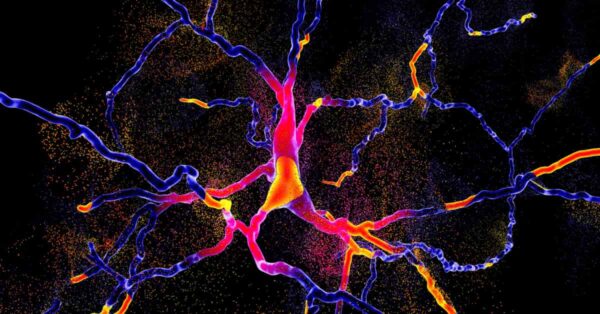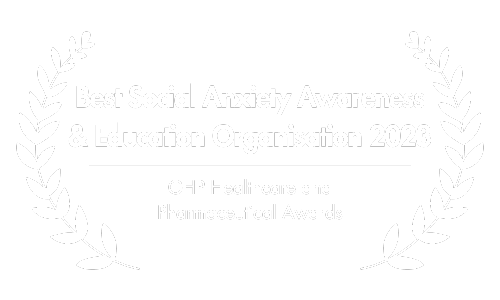The Serotonin-Social Anxiety Link: What You Need to Know
Social anxiety disorder (SAD) is a frequent mental health condition that can significantly impact a person’s quality of life.
Affected individuals commonly fear being disapproved of, rejected, or negatively evaluated by others (American Psychiatric Association, 2013).
Recent research has shown a strong link between an imbalance of serotonin, an important neurotransmitter in the brain, and the development of social anxiety (e.g., Frick et al., 2015).

If you suffer from social anxiety, it can be helpful to understand the connection between serotonin and SAD, as this may help you find effective treatment options and make lifestyle changes to positively impact your brain chemistry.
In this article, we’ll explore the connection between serotonin and social anxiety.
If you stick with us, you’ll learn about the importance of serotonin, get to know possible causes of serotonin imbalances, and we’ll show you ways to improve your serotonin levels in a beneficial way.
Let’s get started.
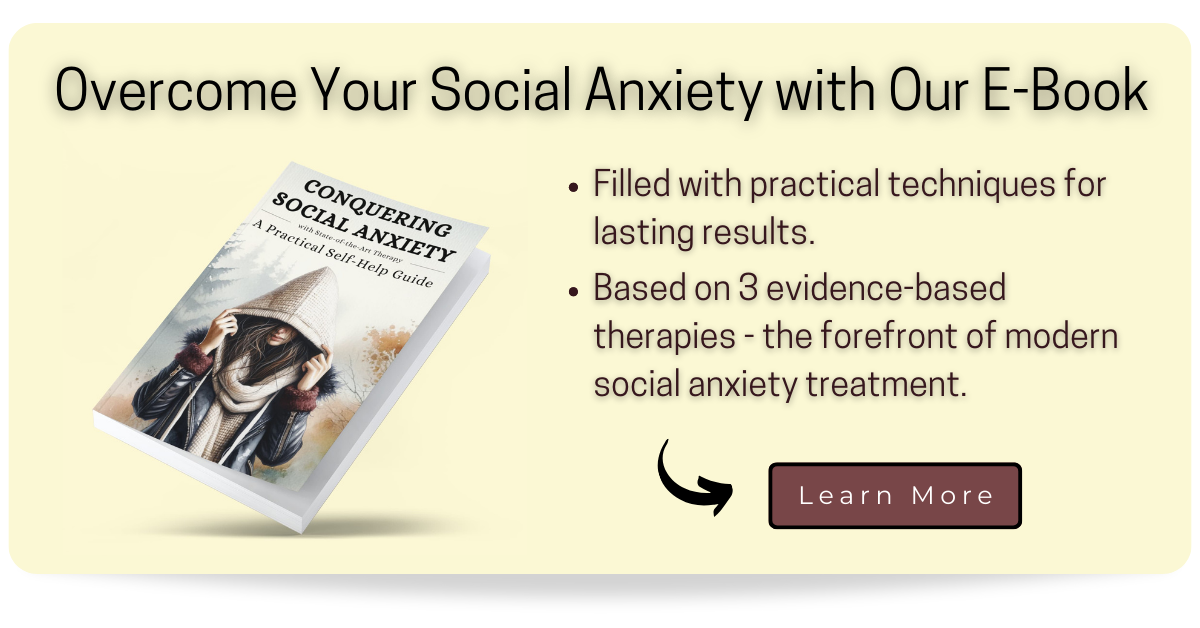
The Importance of Serotonin and Its Role in the Brain
Serotonin is a chemical messenger, also known as a neurotransmitter, that is produced and used by nerve cells in the brain and throughout the body.
It plays an important role in regulating various functions such as your mood, anxiety levels, appetite and sleep.

Serotonin is produced by the body from the amino acid tryptophan, which is found in many foods, especially those high in protein.
Once produced, serotonin travels through your bloodstream and then binds to specific receptors on the surface of nerve cells. This binding initiates a cascade of events that can influence a variety of physiological processes.
Being an inhibitory neurotransmitter, serotonin helps to reduce the activity of certain neurons in the brain. This can exert a calming effect and reduce feelings of anxiety.
However, when there is a shortage of serotonin in the brain, neurons can become overactive, leading to feelings of anxiety and many other symptoms, such as depression (e.g., Millan, 2004; aan het Rot et al., 2009).
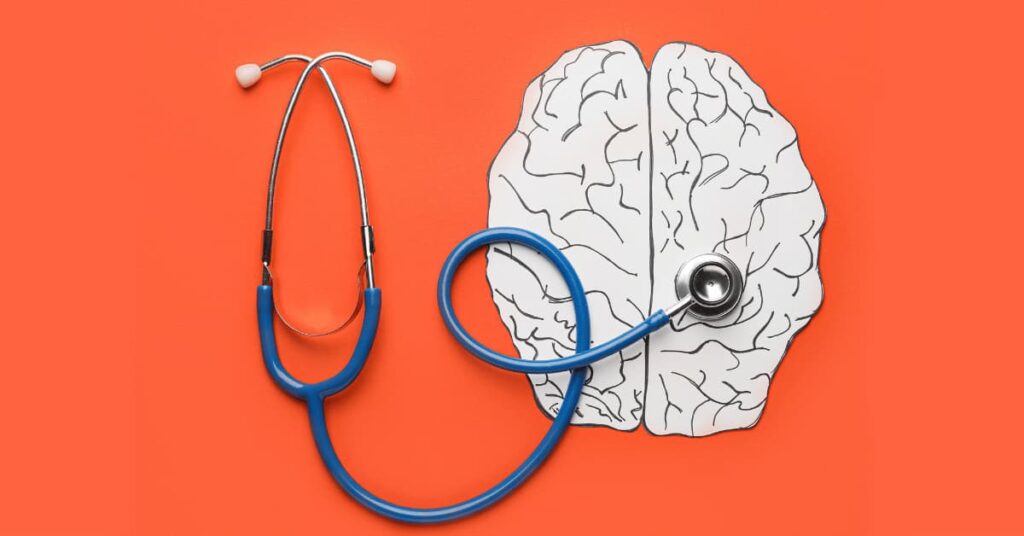
Similarly, an imbalance in serotonin levels can affect other important functions such as sleep, appetite, and sexual behavior. When these functions are impaired, anxiety is often a result.
In addition, low serotonin levels are associated with a number of physical symptoms, including headaches and chronic pain (Aggarwal, Puri, & Puri, 2012; Martin et al., 2017).
Therefore, maintaining adequate serotonin levels is important for overall mental and physical well-being.
In people with social anxiety, an imbalance of serotonin can typically be observed.
Let’s examine this in more detail.
Serotonin Imbalance and Social Anxiety Disorder
The serotonin system includes receptors and the chemicals that bind to them. Research has shown that in people with SAD, the production of these chemicals and their binding to their respective receptors may be altered.
However, as research has yielded mixed results about the relationship between serotonin and social anxiety, there is no clear consensus on the exact changes in the serotonin system in socially anxious individuals.
Some studies suggest that people with SAD have lower serotonin levels, while others suggest that serotonin levels are higher in them.
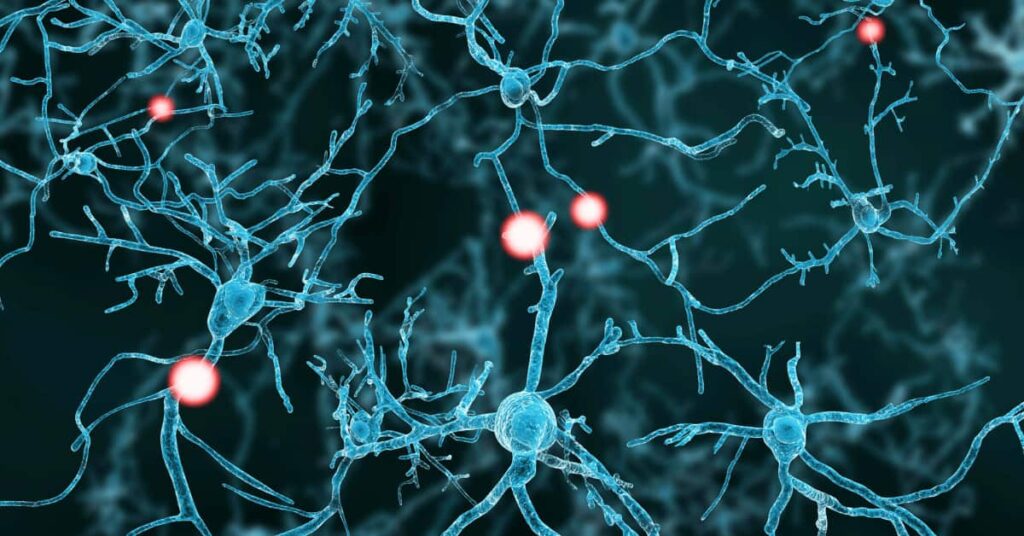
For example, there are several studies that suggest that people with social anxiety have an overactive presynaptic serotonin system (e.g., Frick et al., 2015).
In these cases, increased levels of serotonin synthesis in the dorsal amygdala, a brain region involved in anxiety regulation, were associated with increased social anxiety symptoms.
Similarly, it has been suggested that people with SAD have increased binding of the serotonin 2A receptor in the anterior cingulate cortex (ACC), a brain region involved in emotional processing and the regulation of physiological responses to stress (Preller et al., 2016).
The ACC is also a key area in the brain’s “conflict monitoring network“, which is thought to play a role in social anxiety.
It is believed that increased binding of serotonin 2A receptors in the ACC may lead to an enhanced response to social threat, which in turn leads to increased anxiety in social situations.

In contrast, other studies have found that SAD patients have lower binding of the serotonin 1A receptor in the raphe nuclei, a region of the brainstem that plays an important role in regulating mood and anxiety (e.g., Lanzenberger et al., 2007).
Thus, it seems that in socially anxious people certain areas of the brain may be overactive and others underactive with regards to processes involving serotonin.
However, it is also possible that the relationship between serotonin and SAD varies depending on the specific subtype of SAD, the stage of the disorder, and other individual factors. By the way, you can click here to get to our article on the different subtypes of social anxiety.
With that said, most researchers believe that socially anxious individuals are affected by low serotonin levels (e.g., Sachs et al., 2013).
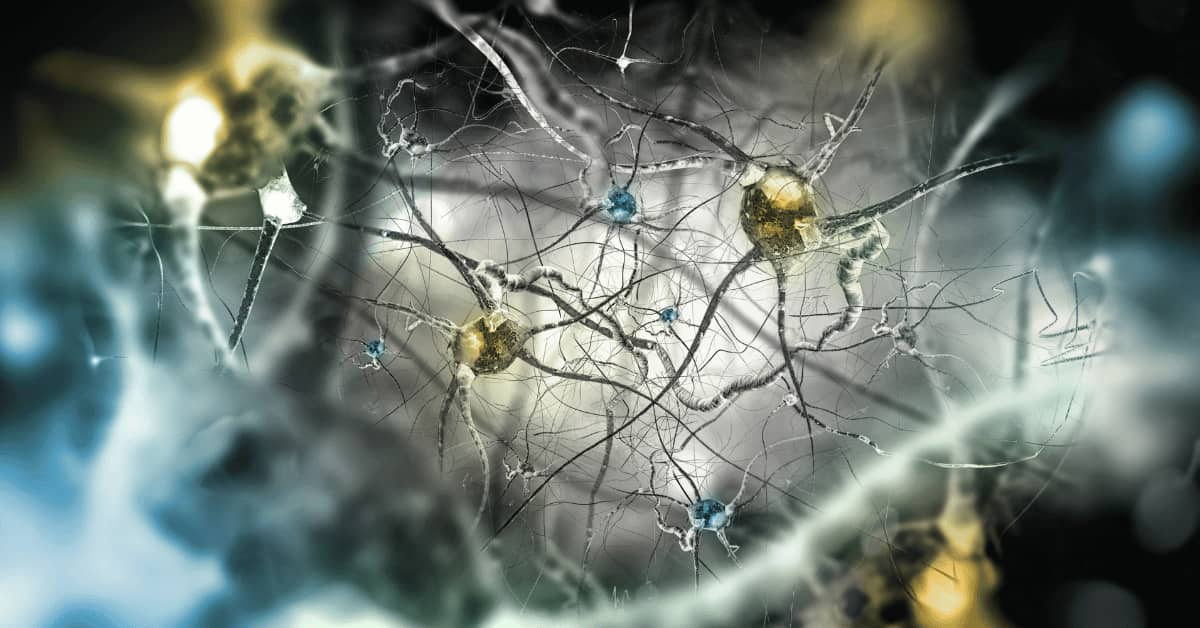
For example, serotonin plays a role in regulating social perception and social memory, which can affect how a person perceives and interacts with others.
When serotonin levels are low, a person may have difficulty interpreting social cues, have negative thoughts about themselves and others, and become more introverted, which can make it harder to establish and maintain social relationships and they may feel more anxious in social situations.
In addition, low serotonin levels can affect the regulation of other neurotransmitters such as dopamine and norepinephrine (De Deurwaerdère, Chagraoui, & Di Giovanni, 2021), which are also involved in regulating mood, anxiety, and social behavior.

When these neurotransmitters are out of balance, this can further promote the development of SAD.
By now you might be wondering, “What causes low serotonin?”.
Reasons for Low Serotonin Levels
The exact cause of low serotonin in people with social anxiety is not fully understood, but there are several possible explanations.
Some of the factors that have been suggested to contribute to low serotonin levels in people with SAD include:
- Genetics (e.g., Hariri et al., 2002): Studies have found that people with SAD have a higher risk of having a family member with the disorder, suggesting that there may be a genetic component to lower serotonin levels. Additionally, some studies have identified specific genetic variations that may increase the risk of being affected.
- Altered Brain Activity (e.g., Meyer & Wilson, 2018): Research has suggested that there may be abnormalities regarding the activity of certain brain areas that are involved in regulating serotonin levels in people with SAD. The exact causes for these alterations are not yet understood.
- Life experiences (e.g., Miller et al., 2009): Trauma, abuse, or other negative life experiences, such as traumatic social events, can alter brain chemistry and increase the risk of low serotonin levels.
- Environmental factors (e.g., Banerjee, 2014): Exposure to stress or other environmental factors, such as chronic illness or substance abuse, can contribute to low serotonin levels and the development of SAD.
- Hormonal imbalances: In the medical community there is a general consensus that imbalances in certain hormones, such as cortisol and estrogen, can lead to low serotonin levels, which can contribute to the development of anxiety disorders, such as SAD.

Please note that research is ongoing and that this list is neither exhaustive nor definite. If you are interested in learning more about the potential causes of SAD, you can click here to be taken to our article which discusses this topic in depth.
Also, some of these factors may represent consequences, rather than causes, of low serotonin levels.
Be that as it may, it is generally understood that increasing serotonin levels in the brains of socially anxious people can have a positive impact on their social anxiety.
So, let’s have a look at some practical things you can do to increase your serotonin levels naturally.

Natural Ways to Boost Serotonin and Ease Social Anxiety
As we will discuss in a moment, one of the ways serotonin levels can be increased is through medication. However, there are several practical ways to increase serotonin levels and improve overall well-being naturally.

The following list includes lifestyle choices that can help increase serotonin levels in the body. Remember that it is important to consult a healthcare professional before trying any of these strategies.
- Exercise regularly (e.g., Meeusen et al., 1996): Regular physical activity has been shown to increase serotonin levels in the brain. Aim for at least 30 minutes of moderate-intensity exercise, such as brisk walking, cycling, or swimming, at least three to five times a week.
- Get Regular Exposure to Light (e.g., Sansone & Sansone, 2013): Exposure to bright light, particularly in the morning, can help to increase serotonin levels in the brain. Being outside for at least 30 minutes a day is recommended.
- Eat the Right Diet (e.g., Friedman, 2018): Eating a diet that is rich in tryptophan, an amino acid that is converted into serotonin in the brain, can help to increase serotonin levels. Foods that are high in tryptophan include chicken, turkey, fish, nuts, seeds, and cheese.
- Practice Relaxation (e.g., Bujatti & Riederer, 1976): Relaxation techniques such as yoga, meditation, and deep breathing can help to reduce stress and promote feelings of well-being, which can increase serotonin levels in the brain.
- Spend Time with Loved Ones (e.g., Young, 2007): Having strong social support networks and positive relationships can help to increase serotonin levels in the brain. Spending time with loved ones and participating in social activities you find pleasant can help to boost mood and reduce feelings of anxiety.
- Get Regular & Good Quality Sleep (e.g., Melancon, Lorrain, & Dionne, 2014): Getting enough quality sleep is important for maintaining healthy serotonin levels. Aim for at least 7-8 hours of sleep per night, and try to maintain a regular sleep schedule.
- Get Regular Massages (e.g., Field, Hernandez-Reif, Diego, Schanberg, & Kuhn, 2005): Massage therapy can help to reduce stress, promote feelings of well-being and increase serotonin levels in the brain.
- Use Music as a Tool (e.g., Moraes et al., 2018): Music therapy can help to reduce stress and anxiety, and increase serotonin levels in the brain. Listening to calming music, or playing a musical instrument can help to reduce stress and promote feelings of well-being.
- Use Scents & Aromas (e.g., Chioca et al., 2013): Aromatherapy with essential oils such as lavender and vanilla can help to promote feelings of calm and well-being, which can help to increase serotonin levels in the brain.
- Receive Acupuncture (e.g., Yoshimoto et al., 2006): Acupuncture, a traditional Chinese medicine, has been shown to help balance the levels of neurotransmitters in the brain, such as serotonin, and can help reduce anxiety and depression symptoms.
- Use Supplements (e.g., Kikuchi, Tanabe, & Iwahori, 2013): Some supplements such as 5-HTP, L-tryptophan, and St. John’s Wort can help to increase serotonin levels in the brain. However, it’s important to note that these supplements may interact with certain medications, so it’s important to speak with a healthcare professional before taking them.

When used regularly, a combination of these lifestyle choices can have a genuinely positive impact on your serotonin levels.
However, it is important to know that these methods can be helpful for many people, but they may not work for everyone.
It is also important to keep in mind that while these strategies may be helpful in boosting mood and reducing feelings of anxiety, they should not be used as a substitute for professional treatment if it is needed.
Now that you have an idea of how to increase serotonin levels naturally, let’s look at a type of prescription medication commonly given to people with social anxiety that also raises serotonin levels in the brain.
This type of medication is typically referred to as SSRIs. Let’s have a closer look at it.
SSRIs: A Medication that Targets Low Serotonin Levels
Selective serotonin reuptake inhibitors (SSRIs) represent a class of antidepressants that increase the level of serotonin in the brain.
They were initially developed to treat depression. However, some patients taking them reported improvements in anxiety symptoms.
As a result, researchers and physicians hypothesized that SSRIs might also be effective in treating anxiety disorders, including SAD.

This prompted researchers to conduct studies to test this hypothesis.
And indeed, SSRIs were found to be effective in reducing the symptoms of SAD. This led to the widespread use of SSRIs as a treatment for social anxiety.
But why do they help?
It is important to note that the exact mechanism by which SSRIs help with social anxiety is not fully understood.
What we do know is that SSRIs inhibit the reuptake of serotonin, meaning they block the process by which serotonin is taken up and recycled by neurons in the brain.
That is, when serotonin is released by nerve cells, it binds to receptors on other nerve cells to transmit a signal. Once the signal has been transmitted, the serotonin is taken up again by the nerve cells that released it – a process called reuptake.
SSRIs work by inhibiting the reuptake of serotonin by nerve cells, which increases the amount of serotonin available to bind to receptors on other nerve cells.
Through this increased availability, SSRIs are believed to alleviate symptoms of anxiety and depression by:
- improving communication between nerve cells in the brain,
- increasing the sensitivity of serotonin receptors,
- and reducing inflammation in the brain.

Research also suggests that SSRIs affect the function of specific brain regions that are involved in the regulation of anxiety, such as the amygdala and the prefrontal cortex (e.g., McCabe & Mishor, 2011).
They may also have effects on the hypothalamic-pituitary-adrenal (HPA) axis, an important neural circuit involved in the body’s stress response (e.g., Barden, 2004).
Moreover, SSRIs may enhance the function of the glutamate NMDA receptor, which is thought to be important in regulating mood, anxiety, and social behavior (Musazzi, Treccani, Mallei, & Popoli, 2013).
It typically takes a few weeks for SSRIs to have an effect as the brain needs time to adjust to the increased levels of serotonin.
It is also important to note that SSRIs do not work for everyone, and other treatment options, such as psychotherapy or other types of medication, may be more effective for some individuals. Also, to find out more about available treatment options, you can click here to get to our complete treatment guide, which includes effective psychotherapies and medications.
Among the most commonly used SSRIs to treat social anxiety are fluoxetine, sertraline, and paroxetine. Remember that it’s crucial to consult your doctor before taking any medication.
This article would not be complete without mentioning another, fundamentally different point of view regarding low serotonin levels. Let’s explore this topic briefly through the lenses of depth psychology.

The Psychological Roots of Low Serotonin
Depth psychology, a branch of psychology devoted to the study of the unconscious mind and its influence on behavior, sees low serotonin levels as an expression of underlying emotional and psychological problems.
According to this view, an imbalance of neurotransmitters such as serotonin may be the result of unresolved emotional conflicts or past traumas stored in the unconscious mind (e.g., Miller et al., 2009).

In the case of anxiety disorders, such as SAD, it is often anger that is suppressed, as affected people typically tend to avoid direct or even indirect confrontation.
For example, research suggests that suppressed or repressed anger may be associated with altered serotonin levels in the brain (McCann & Biaggio, 1990).
Emotional suppression, including suppression of anger and rage, can lead to an accumulation of negative emotions and stress, which in turn can affect levels of neurotransmitters such as serotonin, dopamine, and norepinephrine.
This can lead to an imbalance of these neurotransmitters, which in turn can cause depression, irritability, and (social) anxiety.
In addition, research suggests that anger and rage can activate the HPA axis, which triggers the release of stress hormones such as cortisol, which can affect serotonin levels in the brain (e.g., Essex et al., 2011).

High levels of cortisol can inhibit the production of serotonin, which can then lead to lower levels of serotonin in the brain.
However, please note that suppressed or repressed anger is only one of the many factors that can contribute to altered serotonin levels, and the relationship between these two elements is complex.
The Bottom Line: Understanding the Serotonin-Social Anxiety Link
In summary, serotonin is an important neurotransmitter that plays an important role in regulating mood, anxiety, and social behavior. Low serotonin levels are associated with social anxiety disorder.
The reasons for low serotonin can be many, including genetic factors, stress, poor diet, and certain diseases.
Practical lifestyle choices such as regular exercise, adequate sleep, a balanced diet, and stress management techniques can help increase serotonin levels.
Medications, especially SSRIs, can also be effective in treating social anxiety disorder. In addition, understanding the possible causes of low serotonin levels, such as unresolved emotional issues, can be helpful.

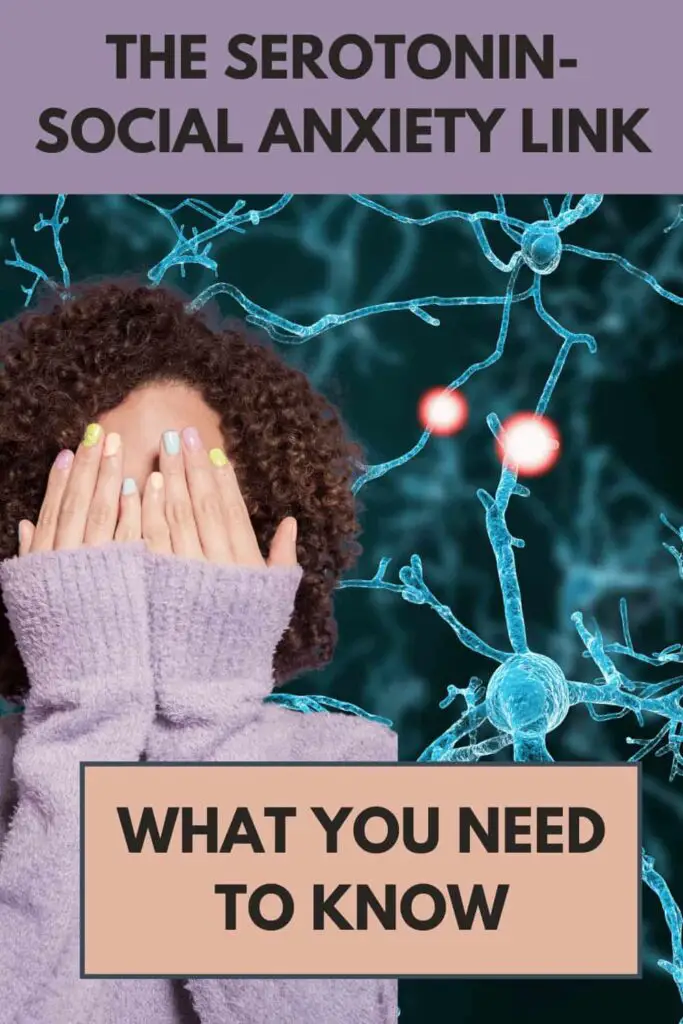
Pin | Share | Follow
[DISPLAY_ULTIMATE_SOCIAL_ICONS]
aan het Rot, M., Mathew, S. J., & Charney, D. S. (2009). Neurobiological mechanisms in major depressive disorder. CMAJ : Canadian Medical Association journal = journal de l’Association medicale canadienne, 180(3), 305–313. https://doi.org/10.1503/cmaj.080697
Aggarwal M, Puri V, Puri S. Serotonin and CGRP in migraine. Ann Neurosci. 2012 Apr;19(2):88-94. doi: 10.5214/ans.0972.7531.12190210. PMID: 25205974; PMCID: PMC4117050.
American Psychiatic Association. (1980). Diagnostic and statistical manual. Washington, DC: APA Press.
Arnsten, A.F.T., & Li, J.C. (2005). Hormonal imbalances, stress and the serotonin connection. Trends in Neurosciences, 28(7), 436-442. https://doi.org/10.1016/j.tins.2005.05.005
Banerjee N. (2014). Neurotransmitters in alcoholism: A review of neurobiological and genetic studies. Indian journal of human genetics, 20(1), 20–31. https://doi.org/10.4103/0971-6866.132750
Barden N. (2004). Implication of the hypothalamic-pituitary-adrenal axis in the physiopathology of depression. Journal of psychiatry & neuroscience : JPN, 29(3), 185–193.
Belden, J.A., Duflou, J.M., & Bremner, J.D. (2015). Trauma and Serotonin: A Review. Depression Research and Treatment, 2015, 1-13. https://doi.org/10.1155/2015/721301
Bujatti, M., & Riederer, P. (1976). Serotonin, noradrenaline, dopamine metabolites in transcendental meditation-technique. Journal of neural transmission, 39(3), 257–267. https://doi.org/10.1007/BF01256514
Chioca, L. R., Ferro, M. M., Baretta, I. P., Oliveira, S. M., Silva, C. R., Ferreira, J., Losso, E. M., & Andreatini, R. (2013). Anxiolytic-like effect of lavender essential oil inhalation in mice: participation of serotonergic but not GABAA/benzodiazepine neurotransmission. Journal of ethnopharmacology, 147(2), 412–418. https://doi.org/10.1016/j.jep.2013.03.028
De Deurwaerdère, P., Chagraoui, A., & Di Giovanni, G. (2021). Serotonin/dopamine interaction: Electrophysiological and neurochemical evidence. Progress in brain research, 261, 161–264. https://doi.org/10.1016/bs.pbr.2021.02.001
Essex, M. J., Shirtcliff, E. A., Burk, L. R., Ruttle, P. L., Klein, M. H., Slattery, M. J., Kalin, N. H., & Armstrong, J. M. (2011). Influence of early life stress on later hypothalamic-pituitary-adrenal axis functioning and its covariation with mental health symptoms: a study of the allostatic process from childhood into adolescence. Development and psychopathology, 23(4), 1039–1058. https://doi.org/10.1017/S0954579411000484
Field, T., Hernandez-Reif, M., Diego, M., Schanberg, S., & Kuhn, C. (2005). Cortisol decreases and serotonin and dopamine increase following massage therapy. The International journal of neuroscience, 115(10), 1397–1413. https://doi.org/10.1080/00207450590956459
Frick, A., Åhs, F., Engman, J., Jonasson, M., Alaie, I., Björkstrand, J., Frans, Ö., Faria, V., Linnman, C., Appel, L., Wahlstedt, K., Lubberink, M., Fredrikson, M., & Furmark, T. (2015). Serotonin Synthesis and Reuptake in Social Anxiety Disorder: A Positron Emission Tomography Study. JAMA psychiatry, 72(8), 794–802. https://doi.org/10.1001/jamapsychiatry.2015.0125
Friedman M. (2018). Analysis, Nutrition, and Health Benefits of Tryptophan. International journal of tryptophan research : IJTR, 11, 1178646918802282. https://doi.org/10.1177/1178646918802282
Hariri, A. R., Mattay, V. S., Tessitore, A., Kolachana, B., Fera, F., Goldman, D., Egan, M. F., & Weinberger, D. R. (2002). Serotonin transporter genetic variation and the response of the human amygdala. Science (New York, N.Y.), 297(5580), 400–403. https://doi.org/10.1126/science.1071829
Kikuchi, A. M., Tanabe, A., & Iwahori, Y. (2021). A systematic review of the effect of L-tryptophan supplementation on mood and emotional functioning. Journal of dietary supplements, 18(3), 316–333. https://doi.org/10.1080/19390211.2020.1746725
Lanzenberger, R. R., Mitterhauser, M., Spindelegger, C., Wadsak, W., Klein, N., Mien, L. K., Holik, A., Attarbaschi, T., Mossaheb, N., Sacher, J., Geiss-Granadia, T., Kletter, K., Kasper, S., & Tauscher, J. (2007). Reduced serotonin-1A receptor binding in social anxiety disorder. Biological psychiatry, 61(9), 1081–1089. https://doi.org/10.1016/j.biopsych.2006.05.022
Martin, S. L., Power, A., Boyle, Y., Anderson, I. M., Silverdale, M. A., & Jones, A. K. P. (2017). 5-HT modulation of pain perception in humans. Psychopharmacology, 234(19), 2929–2939. https://doi.org/10.1007/s00213-017-4686-6
McCabe, C., & Mishor, Z. (2011). Antidepressant medications reduce subcortical-cortical resting-state functional connectivity in healthy volunteers. NeuroImage, 57(4), 1317–1323. https://doi.org/10.1016/j.neuroimage.2011.05.051
Meeusen, R., Thorré, K., Chaouloff, F., Sarre, S., De Meirleir, K., Ebinger, G., & Michotte, Y. (1996). Effects of tryptophan and/or acute running on extracellular 5-HT and 5-HIAA levels in the hippocampus of food-deprived rats. Brain research, 740(1-2), 245–252. https://doi.org/10.1016/s0006-8993(96)00872-4
Melancon, M. O., Lorrain, D., & Dionne, I. J. (2014). Exercise and sleep in aging: emphasis on serotonin. Pathologie-biologie, 62(5), 276–283. https://doi.org/10.1016/j.patbio.2014.07.004
Meyer, J.S., & Wilson, G.J. (2018). Serotonin and brain function: a summary of current knowledge. Neuroscience and Biobehavioral Reviews, 92, 1-19. https://doi.org/10.1016/j.neubiorev.2018.04.011
Millan M. J. (2004). The role of monoamines in the actions of established and “novel” antidepressant agents: a critical review. European journal of pharmacology, 500(1-3), 371–384. https://doi.org/10.1016/j.ejphar.2004.07.038
Miller, J. M., Kinnally, E. L., Ogden, R. T., Oquendo, M. A., Mann, J. J., & Parsey, R. V. (2009). Reported childhood abuse is associated with low serotonin transporter binding in vivo in major depressive disorder. Synapse (New York, N.Y.), 63(7), 565–573. https://doi.org/10.1002/syn.20637
Moraes, M. M., Rabelo, P. C. R., Pinto, V. A., Pires, W., Wanner, S. P., Szawka, R. E., & Soares, D. D. (2018). Auditory stimulation by exposure to melodic music increases dopamine and serotonin activities in rat forebrain areas linked to reward and motor control. Neuroscience letters, 673, 73–78. https://doi.org/10.1016/j.neulet.2018.02.058
Musazzi, L., Treccani, G., Mallei, A., & Popoli, M. (2013). The action of antidepressants on the glutamate system: regulation of glutamate release and glutamate receptors. Biological psychiatry, 73(12), 1180–1188. https://doi.org/10.1016/j.biopsych.2012.11.009
Preller, K. H., Pokorny, T., Hock, A., Kraehenmann, R., Stämpfli, P., Seifritz, E., Scheidegger, M., & Vollenweider, F. X. (2016). Effects of serotonin 2A/1A receptor stimulation on social exclusion processing. Proceedings of the National Academy of Sciences of the United States of America, 113(18), 5119–5124. https://doi.org/10.1073/pnas.1524187113
Sachs, B. D., Rodriguiz, R. M., Siesser, W. B., Kenan, A., Royer, E. L., Jacobsen, J. P., Wetsel, W. C., & Caron, M. G. (2013). The effects of brain serotonin deficiency on behavioural disinhibition and anxiety-like behaviour following mild early life stress. The international journal of neuropsychopharmacology, 16(9), 2081–2094. https://doi.org/10.1017/S1461145713000321
Sansone, R. A., & Sansone, L. A. (2013). Sunshine, serotonin, and skin: a partial explanation for seasonal patterns in psychopathology?. Innovations in clinical neuroscience, 10(7-8), 20–24.
Sebastian, A., Forstmann, B. U., & Matzke, D. (2018). Towards a model-based cognitive neuroscience of stopping – a neuroimaging perspective. Neuroscience and biobehavioral reviews, 90, 130–136. https://doi.org/10.1016/j.neubiorev.2018.04.011
Van den Berg, E.J., Kalsbeek, L.M., & Westenberg, H.J. (2010). Environmental factors and the serotonergic system. Behavioural Brain Research, 208(2), 525-534. https://doi.org/10.1016/j.bbr.2009.09.025
Yoshimoto, K., Fukuda, F., Hori, M., Kato, B., Kato, H., Hattori, H., Tokuda, N., Kuriyama, K., Yano, T., & Yasuhara, M. (2006). Acupuncture stimulates the release of serotonin, but not dopamine, in the rat nucleus accumbens. The Tohoku journal of experimental medicine, 208(4), 321–326. https://doi.org/10.1620/tjem.208.321
Young S. N. (2007). How to increase serotonin in the human brain without drugs. Journal of psychiatry & neuroscience : JPN, 32(6), 394–399.

About the Author: Martin Stork
Martin is a professional psychologist with a background in physical therapy. He has organized and led various support groups for people with social anxiety in Washington, DC and Buenos Aires, Argentina. He is the founder of Conquer Social Anxiety Ltd, where he operates as a writer, therapist and director. You can click here to find out more about Martin.




